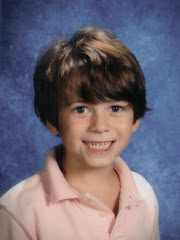So it has been a while since our last update. Ty is off of the tea and we took him to Melbourne FL to see Dr Rossignol. It was a great visit, and we have some hopeful treatments that we will be steadily implementing over time. Dr R. agreed with me that PANDAS is probably an issue with Ty's reaction to the prevnar vaccine back in 2003, the OCD behaviors, high blood strep titers, and gamma strep always in his stool tests. We will be treating Ty with a weekly dose of Zithromax and Dr R thinks they may begin to lower the titers over time.. says it takes about 4-6 months. We have also begun daily Diflucan. Dr R and I believe that because Ty has a tendancy to jump to pre-verbal while on short courses of diflucan, that it may be doing something other than treating gut yeast for him. Ironically however, these past 2 wks. on it we are not seeing a huge jump in echoics for the first time. Surprising, and I hope just clouded by his high Ammonia that came back last week. Maybe when we get that under control (he loses a lot of focus and stims a lot when Ammonia is high), we will see some nice benefits. We also began Spironolactone for brain inflammation just 5 days ago. It is too early to tell, but we have had a few nice things happen the past couple of days, including some attempts at appropriate toy play and nice focus in some photos taken of him. We sent bloodwork for the Ann Connoly test to be performed and will be reviewing that for the Landau Kleffner Syndrome variant when the results are in. Ty certainly fits some of the mold for that and if it were to be true, we would be looking into low dose seizure medications as LKS is a rare form of pediatric epilepsy. Here is an explanation that makes so much sense to me.. as to why his language continues to be impaired and his gains don't necessarily stick over the 5 years we have tirelessly treated his many physiological conditions related to his autism...
All children with LKS can be shown to have seizure activity during the active phase, that usually affects both sides of the brain (although one side may seem more affected), and is often concentrated in areas known to be important for language (centro-temporal region). Some of this activity results in actual seizures but much of it does not, that is, it is ‘sub-clinical’. EEG recordings show that there is a particularly high rate of subclinical epileptiform activity in sleep, which often amounts to nearly continuous spike-and-wave (CSWS) discharges (Electrical Status Epilepticus during sleep or ESES) during the active phase of the disease.
It is thought that regression and impairments are related to these epileptiform discharges during sleep, and that these electrical seizures ‘short-circuit’ the normal wiring so certain functions of the brain are prevented. This seizure activity, which is often-widespread, prevents the child from using his or her brain normally so they regress in abilities. Initially, the brain is not ‘damaged’ in the conventional sense, but rather caught up in an ‘electrical storm’ that blocks certain brain functions (especially language, attention, social functioning). Stopping seizure activity may restore these functions.
LKS mainly affects a child’s language abilities, and this is probably related to the common location of recorded discharges over the key language areas (centro-temporal region). It was initially thought to be specific to language, but certainly current experience is that other higher functions are also commonly affected, including attention, social interaction, behaviour and motor control. Non-verbal cognitive skills are usually relatively spared, although not always, and it is not unusual to have specific or more general learning difficulties.
Unlike physical injury where brain ‘plasticity’ allows other areas of the brain to take up important functions, in LKS, the brain’s capacity and reserves appear to be limited by the electrical activity. Consequently, relocation of skills (such as language) to other brain areas is not generally possible.
We will be navigating this new journey.. changing some supplements recommended by Dr Rossignol, included increased mitochondrial supports as he feels we have fully addressed this dysfunction in Ty yet, and some other cognitive enhancers. He ran lots of blood tests, so we will have a clearer picture in a few weeks for our next appointment!
And as an added update.. the Go Talk is going beautifully. Ty has gone from 10 requests at school to about 75 a day with its use. He is using it appropriately at home also. If the new treatments this summer don't spark more language, we will definetly be pushing for an upgraded communication device for the Fall at school! Thankfully, the staff is thrilled with the improvements in this area, so everyone is on board to see it progress!
Sunday, May 10, 2009
Subscribe to:
Comments (Atom)

